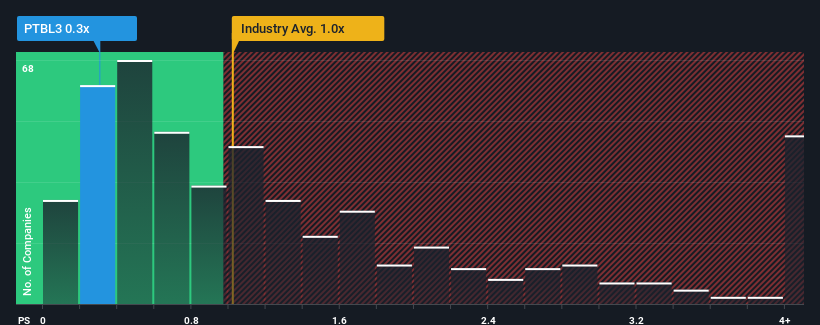A Piece Of The Puzzle Missing From PBG S.A.'s (BVMF:PTBL3) 28% Share Price Climb
PBG S.A. (BVMF:PTBL3) shares have continued their recent momentum with a 28% gain in the last month alone. Looking further back, the 22% rise over the last twelve months isn't too bad notwithstanding the strength over the last 30 days.
Even after such a large jump in price, given about half the companies operating in Brazil's Building industry have price-to-sales ratios (or "P/S") above 0.9x, you may still consider PBG as an attractive investment with its 0.3x P/S ratio. However, the P/S might be low for a reason and it requires further investigation to determine if it's justified.
See our latest analysis for PBG

How PBG Has Been Performing
Revenue has risen firmly for PBG recently, which is pleasing to see. One possibility is that the P/S is low because investors think this respectable revenue growth might actually underperform the broader industry in the near future. If you like the company, you'd be hoping this isn't the case so that you could potentially pick up some stock while it's out of favour.
Although there are no analyst estimates available for PBG, take a look at this free data-rich visualisation to see how the company stacks up on earnings, revenue and cash flow.What Are Revenue Growth Metrics Telling Us About The Low P/S?
PBG's P/S ratio would be typical for a company that's only expected to deliver limited growth, and importantly, perform worse than the industry.
Taking a look back first, we see that the company managed to grow revenues by a handy 11% last year. Revenue has also lifted 22% in aggregate from three years ago, partly thanks to the last 12 months of growth. So we can start by confirming that the company has actually done a good job of growing revenue over that time.
It's interesting to note that the rest of the industry is similarly expected to grow by 5.0% over the next year, which is fairly even with the company's recent medium-term annualised growth rates.
In light of this, it's peculiar that PBG's P/S sits below the majority of other companies. It may be that most investors are not convinced the company can maintain recent growth rates.
What Does PBG's P/S Mean For Investors?
The latest share price surge wasn't enough to lift PBG's P/S close to the industry median. We'd say the price-to-sales ratio's power isn't primarily as a valuation instrument but rather to gauge current investor sentiment and future expectations.
The fact that PBG currently trades at a low P/S relative to the industry is unexpected considering its recent three-year growth is in line with the wider industry forecast. When we see industry-like revenue growth but a lower than expected P/S, we assume potential risks are what might be placing downward pressure on the share price. While recent
It's always necessary to consider the ever-present spectre of investment risk. We've identified 3 warning signs with PBG (at least 2 which don't sit too well with us), and understanding them should be part of your investment process.
Of course, profitable companies with a history of great earnings growth are generally safer bets. So you may wish to see this free collection of other companies that have reasonable P/E ratios and have grown earnings strongly.
New: Manage All Your Stock Portfolios in One Place
We've created the ultimate portfolio companion for stock investors, and it's free.
• Connect an unlimited number of Portfolios and see your total in one currency
• Be alerted to new Warning Signs or Risks via email or mobile
• Track the Fair Value of your stocks
Have feedback on this article? Concerned about the content? Get in touch with us directly. Alternatively, email editorial-team (at) simplywallst.com.
This article by Simply Wall St is general in nature. We provide commentary based on historical data and analyst forecasts only using an unbiased methodology and our articles are not intended to be financial advice. It does not constitute a recommendation to buy or sell any stock, and does not take account of your objectives, or your financial situation. We aim to bring you long-term focused analysis driven by fundamental data. Note that our analysis may not factor in the latest price-sensitive company announcements or qualitative material. Simply Wall St has no position in any stocks mentioned.
About BOVESPA:PTBL3
PBG
Manufactures, exports, and sells ceramic and porcelain products in Brazil and internationally.
Low risk and slightly overvalued.
Market Insights
Community Narratives




